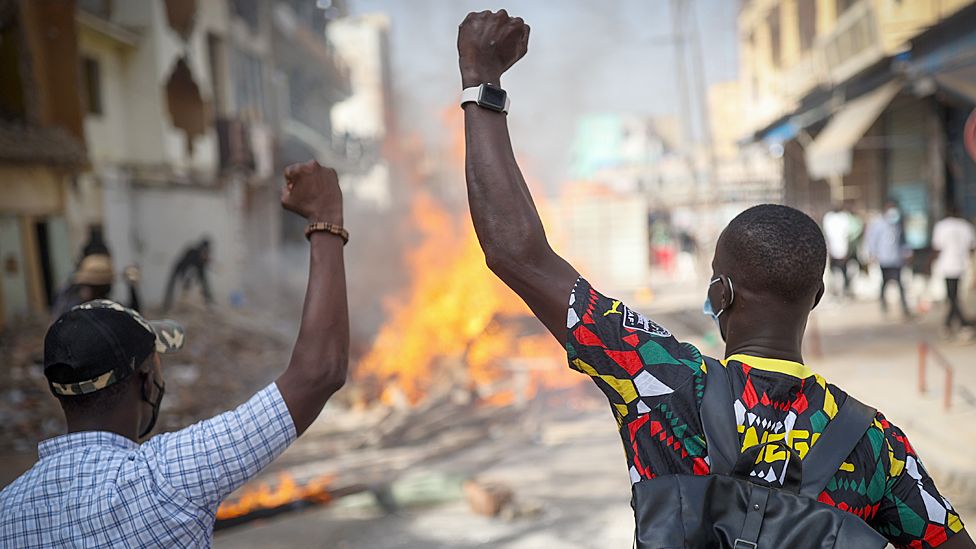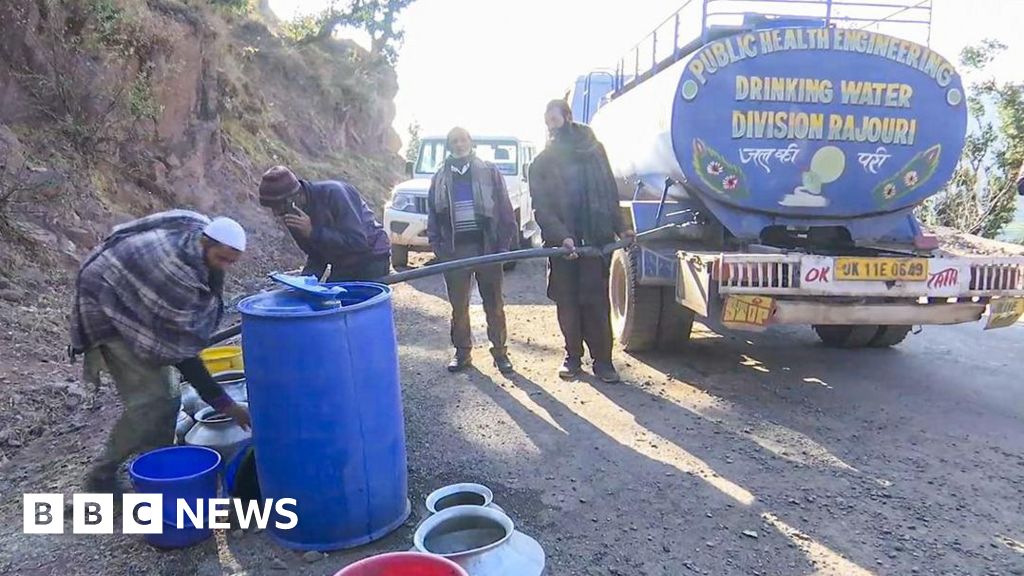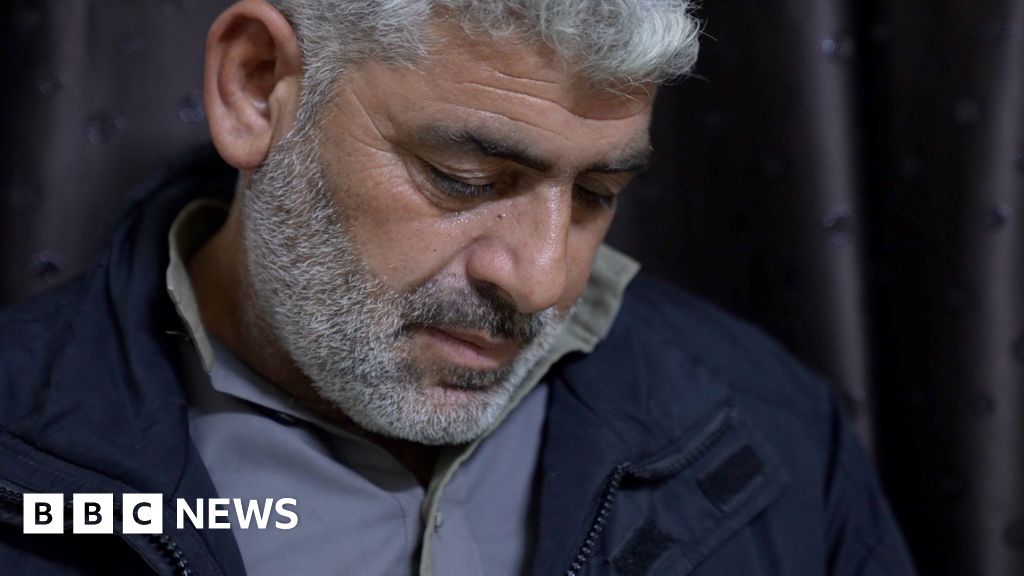ARTICLE AD BOX
 Image source, Getty Images
Image source, Getty Images
By Nicolas Négoce
BBC News, Dakar
Senegal appears to be having an identity crisis - its citizens are proud of the fact that it is considered one of West Africa's most stable democracies, and many are outraged that this reputation is now on the line.
"We feel betrayed by Macky Sall," say a group of imams meeting in a mosque in the capital, Dakar, about the political crisis that hit the country a week ago when MPs backed President Sall's decision to delay this month's presidential election until December.
"The president must review this. It's unacceptable," explains Ismael Ndiaye, the general secretary of Senegal's League of Imams.
"It never happened before. Senegal never had a presidential election delayed. We feel betrayed. We feel misunderstood."
Islam is the predominant religion in Senegal - and comments such as these from influential Muslim leaders, who have in the past mediated to resolve political tension, carry huge weight.
Their blunt words reflect the wave of anger gripping the country as protesters take to the streets.
Image source, AFP
Image caption,Protesters run past a mosque in Dakar as tear gas is fired by the security forces
President Sall has justified his move, saying time is needed to resolve a dispute over who is eligible to stand as a presidential candidate after several opposition contenders were barred.
But those on the streets see the postponement as a way for Mr Sall to on to power beyond the end of his second term on 2 April.
In his first interview since the announcement, President Sall denied this was his intention.
"I am absolutely seeking for nothing except to leave a country in peace and stability," he told the Associated Press over the weekend.
"I don't want to leave behind a country that will immediately plunge into major difficulties."
These words ring hollow to his critics given his stance before his election in 2012, when he strongly objected to then-President Abdoulaye Wade seeking a third term amid deadly protests.
"A president cannot extend his term of office. It's not possible," Mr Sall, who once served as Mr Wade's prime minister, said during the 2011 election campaign.
"He can't extend his term by even one day, otherwise the country will be plunged into chaos because the people would not recognise his legitimacy and there would no longer be authority in the country."
Watch: The president who vowed to play by the rules but isn't
There have been violent protests across Senegal over the past week, reportedly leaving three people dead.
One of them was a geography undergraduate who died in clashes with police on a university campus in the northern city of Saint-Louis.
In Dakar, debris remains strewn across the streets after stand-offs with the security forces, who fired tear gas to disperse protesters.
Many of the four million inhabitants of the city are upset by the turn of events.
Fanta Diallo ventured out over the weekend to buy provisions for what seem like uncertain times ahead.
"I am hurt and ashamed," she told the BBC.
Scared of further violence, she wants civil society to call a "dead city" general strike to show their anger against parliament's backing of the vote delay.
"This is not normal. We are not in a monarchy. I came to town today so I could buy everything I need."
Adamadou Bayeshare, who was out in central Dakar on Saturday with his friend Aminata Issete, agreed.
"We need to demonstrate peacefully for what we believe is right, but we absolutely need to do something. I am personally very, very upset," he told the BBC.
Ms Issete was a little shy about being interviewed at first and then became very animated.
"We are exhausted, we are upset and deeply disappointed. What is wrong with our country? What is wrong with that man?" she asked about the 62-year-old president.
"Why this disrespect towards Senegal's own citizens? We don't deserve this. We want to vote for a new president," she said.
Image source, AFP
Image caption,More than 60% of Senegal's population is under the age of 25
Defeated, disappointed, upset. Those are the recurrent words on the streets, echoed on social media where videos and pictures are circulating showing alleged police brutality from the protests.
These young people are also those who voice frustration over lack of jobs and form the backbone of support for Ousmane Sonko, a popular opposition leader who has been excluded from the presidential race because of a defamation conviction.
He has faced many legal battles in recent years and has been jailed in a separate case for calling for insurrection, conspiracy with terrorist groups and endangering state security. This was in July, when his party was also banned.
The 49-year-old maintains all the charges are politically motivated. Even with the election delayed until 15 December, there is little chance he will be allowed to stand - but anyone he backs might have a chance of winning.
It is his stance on the economy that has particularly worried Senegal's elite - but has won him a huge amount of support. He criticises the country's close relationship with France, the former colonial power.
The former tax collector wants a withdrawal from the CFA franc - the regional currency used by 14 African countries, which is pegged to the euro under a French government guarantee. Critics fear such a move would spell economic disaster.
The next nine months may give the weak ruling coalition a chance to bolster its chances in the election and perhaps consider a stronger candidate in place of Mr Sall's chosen successor, Prime Minister Amadou Ba, who is felt by some to lack charisma.
The postponement may also work in favour of another opposition leader Karim Wade, son of the former president, who was disqualified as he had not renounced his French citizenship in time - electoral laws do not allow dual nationality.
It is hard to see how a solution will be found that can calm tension
Government spokesperson Abdou Karim Fofana reiterated that President Sall would not risk his credibility for just a few more months in power.
"It's not funny for him. He did this to preserve his country as he is mature and responsible," he told the BBC.
With Mr Sonko's level of support and the feeling that the judiciary has been used to exclude him from the race, it is hard to see how a solution will be found that can really calm tension.
Law expert El-Hadji Omar Diop says another scenario could play out.
"President Sall may decide to step down the day after 2 April. In this case, the National Assembly president would assume power and call a new election within two to three months," the university lecturer said.
More demonstrations are planned for Tuesday, though they have not been authorised yet by the authorities.
Mamadou Faye, a father of three, hopes this will get their message across without any need for "dead city" strikes as he says he cannot afford not to work.
"No-one is going to help me. We are tired of all of this. We just want to be able to feed our family."

 11 months ago
80
11 months ago
80








 English (US) ·
English (US) ·